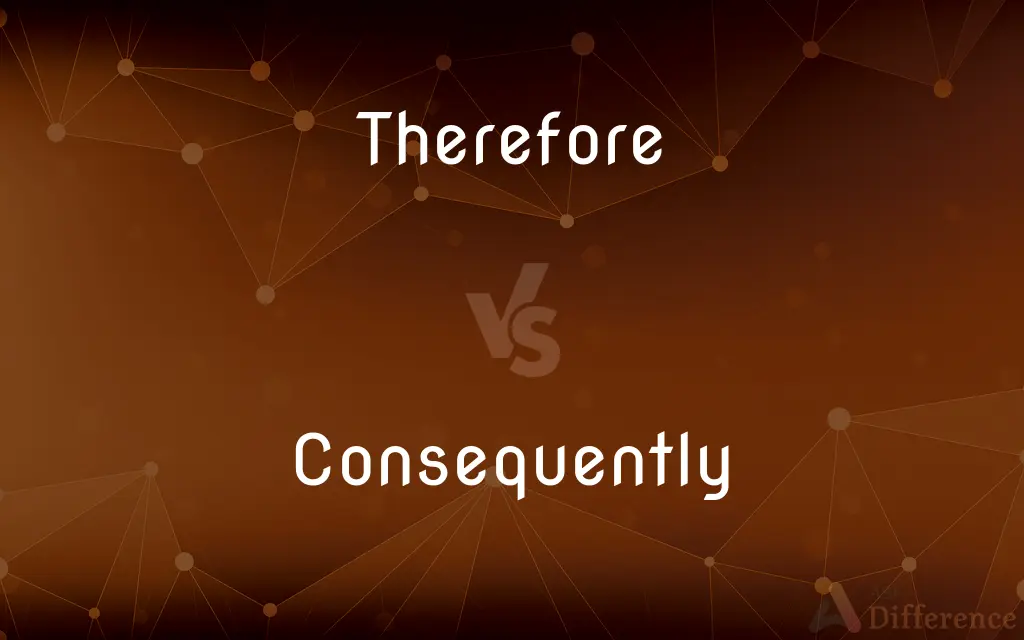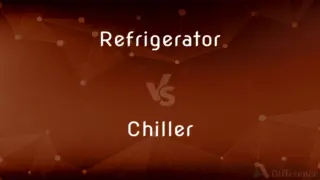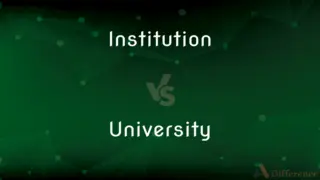Therefore vs. Consequently — What's the Difference?
Edited by Tayyaba Rehman — By Fiza Rafique — Updated on October 30, 2023
"Therefore" implies a logical conclusion, while "consequently" denotes a resulting action or condition.

Difference Between Therefore and Consequently
Table of Contents
ADVERTISEMENT
Key Differences
"Therefore" is commonly used to introduce a conclusion that logically follows from the preceding argument or statement. "Consequently" also introduces a result but emphasizes the outcome or effect of a previous action or situation.
"Therefore" often serves as a bridge in logical reasoning, indicating a direct connection between cause and effect. "Consequently" tends to highlight the aftermath or consequences of an event, pointing more towards the effects rather than the reasoning process.
In formal writing, "therefore" is frequently used to denote the culmination of a logical argument. In contrast, "consequently" can be used in both formal and informal contexts to indicate a sequence of events where one directly results from another.
While "therefore" is usually closely tied to the premises of an argument, "consequently" often implies a more practical or real-world result. "Therefore" is more about deducing, while "consequently" is about what follows.
In essence, "therefore" is more closely associated with the process of reasoning and deduction, often used in mathematical, philosophical, or formal arguments. "Consequently" leans towards practical implications and real-world outcomes, highlighting the chain of cause and effect.
ADVERTISEMENT
Comparison Chart
Primary Usage
Indicates logical conclusion
Indicates resulting action or condition
Contextual Usage
Common in formal, logical reasoning
Used in both formal and informal contexts
Emphasis
On logical connection
On outcome or effect
Common Associations
Deduction, reasoning
Aftermath, consequences
Tone
Often formal and deductive
Can be both formal and practical
Compare with Definitions
Therefore
For that reason.
She was the only one with access to the information; therefore, she must be involved.
Consequently
Following as a result or effect.
She won the lottery and, consequently, quit her job.
Therefore
As a result of.
The roads were icy; therefore, the school was closed.
Consequently
As a result.
He missed the train and consequently was late for the meeting.
Therefore
Used to introduce a logical conclusion.
All humans are mortal; Socrates is human; therefore, Socrates is mortal.
Consequently
Hence; thus.
The roads were blocked; consequently, they took a detour.
Therefore
In consequence of that.
The company failed to meet its targets; therefore, layoffs were inevitable.
Consequently
Therefore; as a consequence.
The storm was severe; consequently, many trees fell.
Therefore
Consequently; hence.
It was raining heavily; therefore, they decided to cancel the picnic.
Consequently
As a logical outcome.
The evidence was conclusive; consequently, the jury found him guilty.
Therefore
For that reason or cause; consequently or hence.
Consequently
As a result; therefore.
Therefore
(conjunctive) Consequently, by or in consequence of that or this cause; referring to something previously stated.
Traditional values will always have a place. Therefore, they will never lose relevance.
Consequently
(conjunctive) As a result or consequence of something; subsequently.
He didn't wake up early. Consequently, he was late to work.
Therefore
For that; for it (in reference to a previous statement)
Consequently
Subsequently, following after in time or sequence.
Therefore
For that or this reason, referring to something previously stated; for that.
I have married a wife, and therefore I can not come.
Behold, we have forsaken all, and followed thee; what shall we have therefore?
Consequently
By consequence; by natural or logical sequence or connection.
Therefore
Consequently; by consequence.
He blushes; therefore he is guilty.
Consequently
(sentence connectors) because of the reason given;
Consequently, he didn't do it
Continued to have severe headaches and accordingly returned to the doctor
Therefore
(used to introduce a logical conclusion) from that fact or reason or as a result;
Therefore X must be true
The eggs were fresh and hence satisfactory
We were young and thence optimistic
It is late and thus we must go
The witness is biased and so cannot be trusted
Consequently
As a consequence;
He had good reason to be grateful for the opportunities which they had made available to him and which consequently led to the good position he now held
Therefore
As a consequence;
He had good reason to be grateful for the opportunities which they had made available to him and which consequently led to the good position he now held
Common Curiosities
What is the primary function of "therefore"?
To introduce a logical conclusion.
Does "consequently" imply cause and effect?
Yes, it highlights the effect of a cause.
Is "therefore" formal?
It's often used in formal and logical contexts.
Does "therefore" require a preceding argument?
Typically, it follows a statement or premise.
Can "consequently" be used interchangeably with "therefore"?
In many contexts, yes, but "consequently" emphasizes the outcome more.
Can "therefore" be used in everyday conversation?
Yes, but it's more common in formal or reasoned discourse.
Can "consequently" start a sentence?
Yes, it can begin a sentence to introduce a result.
Is "therefore" a conjunction?
It's considered a conjunctive adverb.
Does "consequently" always follow a negative cause?
No, it can follow both positive and negative causes.
Is "consequently" more about results?
Yes, it emphasizes the resulting actions or conditions.
Is "therefore" used in mathematical proofs?
Yes, frequently in logical or mathematical conclusions.
Is "consequently" linked to practical implications?
Often, it relates to real-world outcomes and effects.
Does "consequently" have informal uses?
Yes, it's used in both formal and informal contexts.
Are "therefore" and "consequently" synonyms?
They are similar but have subtle differences in emphasis.
Can "therefore" imply a cause-and-effect relationship?
Indirectly, by linking a premise to a conclusion.
Share Your Discovery

Previous Comparison
Refrigerator vs. Chiller
Next Comparison
Institution vs. UniversityAuthor Spotlight
Written by
Fiza RafiqueFiza Rafique is a skilled content writer at AskDifference.com, where she meticulously refines and enhances written pieces. Drawing from her vast editorial expertise, Fiza ensures clarity, accuracy, and precision in every article. Passionate about language, she continually seeks to elevate the quality of content for readers worldwide.
Edited by
Tayyaba RehmanTayyaba Rehman is a distinguished writer, currently serving as a primary contributor to askdifference.com. As a researcher in semantics and etymology, Tayyaba's passion for the complexity of languages and their distinctions has found a perfect home on the platform. Tayyaba delves into the intricacies of language, distinguishing between commonly confused words and phrases, thereby providing clarity for readers worldwide.














































